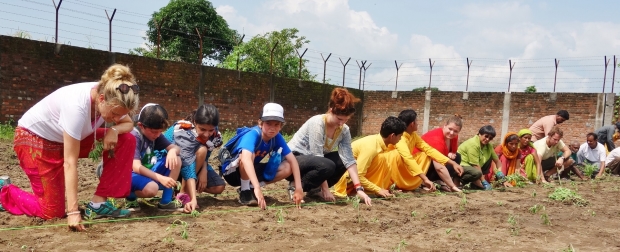GAP members join with GIWA for Tulsi Van Plantation for a Green Ganga
Ganga Action Parivar (GAP) and Global Interfaith WASH Alliance (GIWA) members and volunteers went out to Veerpur Khurd, Rishikesh to give their helping hand in the plantation of over 1000 tulsi (holy basil) plants. Individuals from America interning with GAP and GIWA as well as visiting volunteers and their families were eager to practice yoga of the mat. Students of the Parmarth Gurukul as well as full-time volunteers of GAP joined as one world family in the monsoon sowing celebrations.
The initiative is a joint programme of Ganga Action Parivar (GAP), GIWA and Organic India, inspired by Pujya Swami Chidanand Saraswatiji, Founder of GAP, to make the banks of Mother Ganga clean, green and serene. Pujya Swamiji’s often encourages people, “It is not enough that we say Har Har Gange but we must also now say Herbal Gange. We must work together to plant herbs, medicinal plants and trees all along the banks of Mother Ganga as one of the simplest and strongest actions we all can take to protect our precious Himalayan soil from erosion, to abate pollution in our waterways, to prevent global warming and to preserve our air and our environment.”
He therefore encourages people to say, “Har Har Gange! Herbal Gange! and Har Bal Gange!” He emphasizes that Har Bal or literally translated to ‘everyone’s strength or commitment’ is vital and key to restore and protect Mother Ganga and Mother Nature.
With His vision and leadership Pujya Swamiji inspired Shri Bharat Mitraji, President and Founder of Organic India, to pledge and join with his dedicated and devoted team in the green vision and mission to make the banks of Mother Ganga organic and clean. Pujya Swamiji shared with him that Ganga’s waters irrigate one third of India and the Ganga River Basin covers nearly 43% of the land mass of India, being home to 50% of India’s poor who suffer daily from the pollution dumped into the holy waters of Mother Ganga. He urged that the Organic Revolution must start from the banks of Mother Ganga. Thus, an Organic Ganga is the key to a truly Organic India.
Pujya Swamiji further emphasized that sacred herbs like Tulsi can help us bridge the gap from Toxic to Tonic and lead us on our Journey from Junk to Jeevik. In fact, today where contaminates and toxins in our water bodies are making our foods inedible. A recent report noted that vegetable farming is being banned on banks of Yamuna due to the toxic and filthy pollutants in the Yamuna River. The need for a shift from toxic to tonic could not be greater.
Living up to a legacy of excellence, Shri Bharat Mitraji, whose Indian name literally translates to a friend of India, is serving the land and the people of India with his time, talent, technology and tenaciously dedicated team. His team is also planning a large-scale gathering or festival bringing together innovative thinkers, scholars, scientists, activists and leaders on the banks of Mother Ganga to co-create and implement sustainable solutions that can UPLIFT Uttarakhand towards a cleaner, greener more holistic future. The conference is being planned in early November.
With the vision and determination of Shri Krishan Guptaji,Organic India MD & Global CEO of Organic India, the pilot plan in Veerpur and other regions of Uttarakhand have kicked off and will soon become tangible and real holistic models for the rest of the state, providing a sacred space for the Himalayan farmers to get trained and educated about the benefits, tips and techniques of organic farming. These particular plantation efforts by GAP volunteers was lead on the field by the experience and expertise of Shri Ratan Bhartiji of Organic India.
Tulsi (holy basil) is the most revered and sacred herb in India. It is rich in antioxidants and phytochemicals that help support one’s immune and cardiovascular systems. Various varieties and carefully prepared organic certified Tulsi Tea is Organic India’s top-selling products and through their Corporate Social Responsibility is being re-envisioned by their team to create sustainable source of income for farmers all around India. The leaves of Tulsi plant are used in teas and tonics to help purify and cleanse the body of toxins and illnesses as well as Tulsi is already commonly planted and worshiped outside of most homes in India.
Just as Indian families keep their temple altars and homes clean, in the same way, by planting holy basil and other sacred plants all along the banks of Mother Ganga, Ganga Action Parivar hopes to raise awareness that we must all work together to keep our river bodies and our Earth clean and green. Therefore, the plantation of tulsi, other medicinal herbs and super-foods, such as quinoa, can create a mutually beneficial link between farmers, their community, their environment and their world.
Click here to view photos from the event >>







